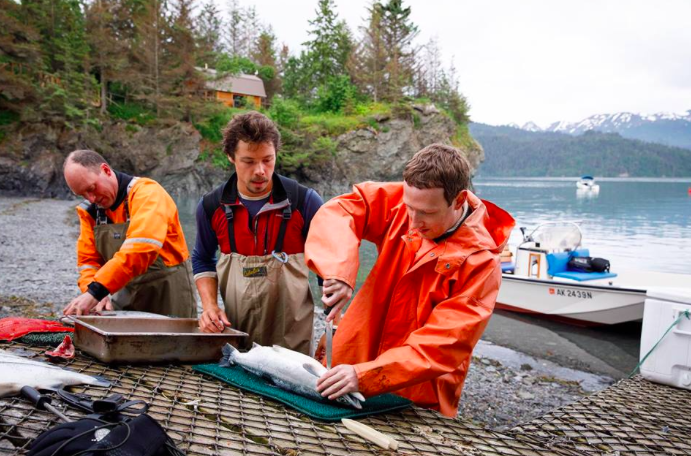
KIDS IN CHARGE
When Rep. Scott Kawasaki is serving as the Speaker of the House, you know things are off the rails in Juneau. Where Speaker Bryce Edgmon is off to is anyone’s guess.
But few members of the Democrat-run majority occupied their seats during today’s floor session, so nothing of substance could be accomplished.
Rep. Sam Kito of Juneau was off at an insurance conference.
WHAT HAPPENED TO HB 111?
Reps. Geran Tarr and Andy Josephson this week offered a version of House Bill 111 they knew was unacceptable to the Senate. They added a provision into the bill that was so onerous that it send a chill down the spine of every oil executive in the state.
[Read: House majority has new idea: Kill oil industry]
But talks go on between conference committee leaders, and there’s still a good chance that the Legislature will pass a version of HB 111 that ends the cash credit program, Sen. Cathy Giessel told the Mike Porcaro radio show yesterday.
WHY DOESN’T THE GOVERNOR USE HIS POWER?
Gov. Bill Walker could signal to the House that the only bill he needs to sign this minute is the ending of the cash credit program. The Senate version of HB 111 does that and backdates the end of the program to July 1, 2017. If getting a more stable fiscal plan is his goal, then this is a game of yards and and ending cashable credits would be a crucial first down.
Rep. Geran Tarr and Andy Josephson added provisions that essentially used this piece of legislation to force negotiations next year on reworking the entire oil tax program…again. They are seeking profound changes this year, too, in their version. Are they in communication with the governor?
Why Walker has chosen to remain silent on this critical legislation, which he asked the Legislature to deal with in special session, has to do with his own re-election bid. It’s possible his Chief of Staff Scott Kendall has told him to stay out of it, because every time he tries to broker deals in the Legislature he gets his nose bloodied.
WHAT WOULD THE COLLAPSE OF HB 111 MEAN?
In addition to costing Alaska $1 million a day, a collapse of HB 111 would signal the intent of Democrats to use oil taxes as a dog whistle for left-of-center voters in the 2018 General Election.
Knowing that the oil industry workers have left the state in droves, Democrats would use the changing electoral demographics to their advantage and put forth an initiative that appeals to the greatest possible number of voters, under the same banner as they have used before: “It’s Our Oil.”
That would help them as they try to flip the Senate to Democrat control, and also win the race for governor for either Gov. Bill Walker, a nonpartisan brought into office by the Alaska Democrat Party, or Mark Begich, a true-blue Democrat.
Many capitol observers believe that the Democrat-run House majority doesn’t want HB 111 to pass, because somewhere out there, Gov. Walker associate Robin Brena or Jim Lottsfeldt of MidnightSunAK fame is setting up an independent expenditure group to push such an initiative.
Is Gov. Walker quietly supporting this gambit?
The downside for Alaskans is that this would cause oil tax credits to accumulate over the next year or two, severely curtailing the state’s fiscal options.
WHAT ELSE WILL DRIVE VOTERS IN 2018?
Salmon and development. Lt. Gov. Byron Mallott will, by Monday, July 17, issue his decision on whether to certify the Stand for Salmon petition and place that question to voters on the November, 2018 ballot.
The proposal calls for an update to laws pertaining to any development in Alaska and would be devastating for mines like Donlin, Fort Knox, and any other mine proposed or operating in the Western Alaska watershed of Bristol Bay. It would also be detrimental to the private property rights of all Alaskans.
The title of the initiative is “An act providing for the protection of wild salmon and fish and wildlife habitat.”
WOULDN’T THAT GO ON THE PRIMARY BALLOT?
If the legislative session ended before 120 days next year, those measures would go on the August primary ballot, but it is likely that Democrats will want them on the General Election ballot in order to bring their voters out. If this chain of events unfolds, we can expect a protracted legislative season next year with special session(s) dragging on into late May, at the very least.
This is because state law does not allow a ballot initiative within 90 days of a legislative session. So, by being in session in late May, the ballot initiative would be pushed onto the Fall general election ballot, where it could help Democrats the most.
WHAT HAPPENED TO THE CAPITAL BUDGET?
It has not been passed and will require another special session. The governor will not want to leave money on the table, because the State draws significant federal dollars through the capital budget process, so expect an official call for it over the weekend, although the governor might give legislators a few weeks off.
Of course, the House and Senate could call themselves back into session immediately and deal with it.

SPOHNHOLZ GOES TO WASHINGTON: Is it true Gov. Bill Walker and Rep. Jason Grenn, both nonpartisan politicians, were joined at the Centrist Project media event in Washington, D.C. by Rep. Ivy Spohnholz this week? Spohnholz is a Democrat representing East Anchorage. Is she queueing up to run for lieutenant governor as an independent?





 TOP COP: Juneau has a new police chief. Ed Mercer, currently deputy chief, will take over when Chief Bryce Johnson leaves for a position in Idaho later this month. Mercer has spent 17 years with PFD, working his way through the ranks. Before that, he was a police officer in Sitka.
TOP COP: Juneau has a new police chief. Ed Mercer, currently deputy chief, will take over when Chief Bryce Johnson leaves for a position in Idaho later this month. Mercer has spent 17 years with PFD, working his way through the ranks. Before that, he was a police officer in Sitka.








